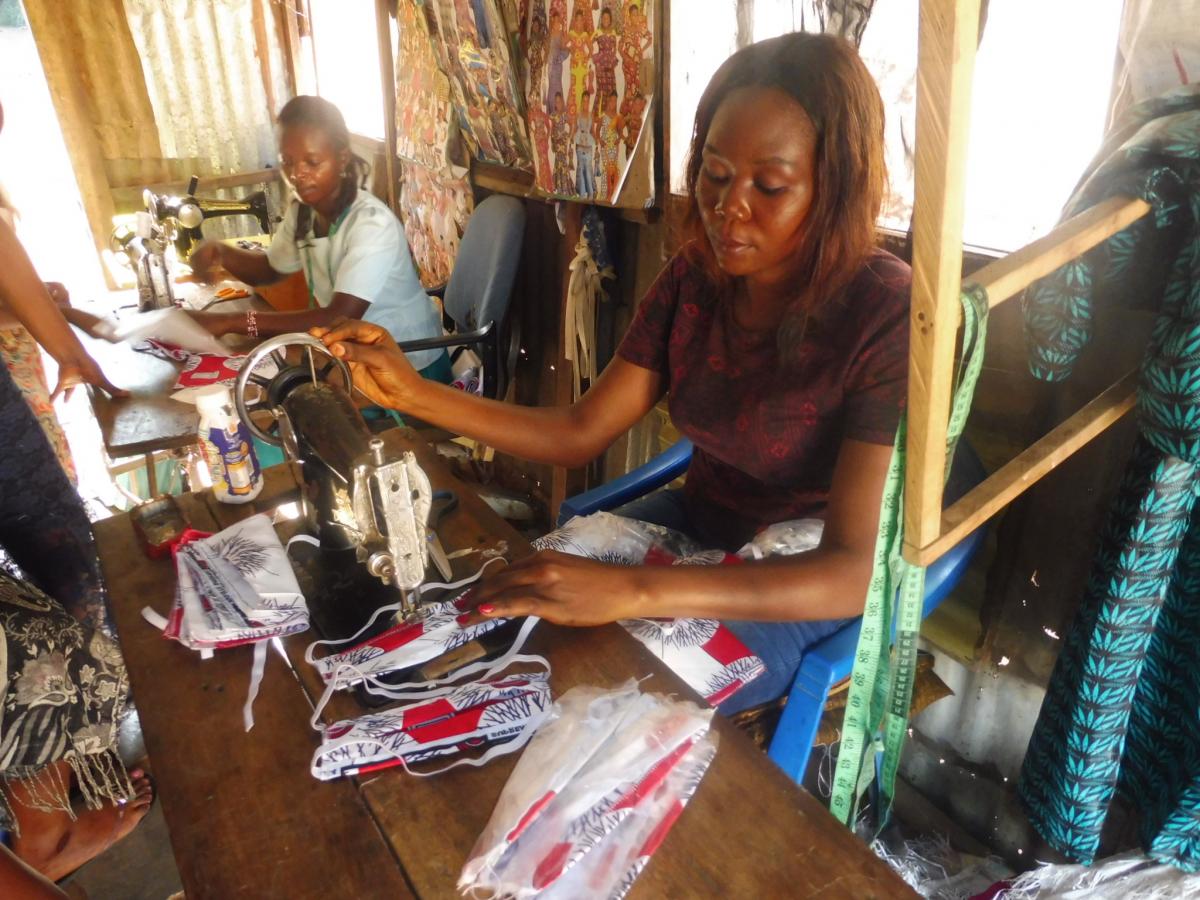Search
Viewing 2175 to 2190 of 3119 news
-

Enabel and the World Food Programme partner to connect Kigoma farmers to market in refugee food assistance - Tanzania
Cindy SPIEKART | 08/06/2020
World Food Programme and Enabel join achievement has been published in the paper edition of "The Guardian" in Tanzania. Here under, you'll find extracts of the article, the full article is available here: https://www.ippmedia.com/en/business/belgian-agency-enabel-team-wfp-offer-kigoma-farmers-marketKakonko, like neighbouring districts, has red soil that turns into a heavy dust during the dry season. When it rains, most of the residents are busy planting maize, cassava, beans, bananas as well as other staple crops. Many of the farmers are dependent of the annual harvest for the majority of their income for the entire year. “Every year we are in the fields working, but the lingering question always is, ‘Are we going to be able to find a buyer?’ and ‘How much will we get,’” says Jackson Christopher, a forty-year-old farmer, born and raised in Kakonko. Kakonko is in Kigoma region, bordering Burundi in the northwest of Tanzania. It is estimated that as a region, over 90,000 metric tonnes of beans – enough to fill 3,000 trucks - are produced in Kigoma each year. Of this, 24,000 metric tonnes are “surplus” and traded within Tanzania, supplying markets such as Dar es Salaam, and in neighbouring regions.For smallholder farmers like Jackson, accessing these markets can be a daunting challenge. Typically, farmers market their produce locally within the village or ward. A buyer might come and purchase the produce, but the prices can be unfavourable for the farmer who is left with little to no other option. For the buyer, receiving consistent quality can be a challenge and transporting the produce up the supply chain can be expensive. “That is why we use a value chain approach to organize smallholder farmers to produce high-quality produce and bring it to market,” said Earnest Musinamwana, Agricultural Marketing Advisor for Enabel – The Belgian Development Agency. Enabel, with funding from the Government of Belgium, works with 15,000 farmers throughout Kigoma region under the Sustainable Agriculture Kigoma Regional Project (SAKIRP). Using a pro-poor value chain development approach, farmers are systematically supported from production all the way through storage and marketing. Access to finance helps farmers purchase various agro inputs like improved and marketable seed varieties, pesticides and fertilizer while training and extension coaching on good agricultural practices helps farmers to maximize the quantity and quality of their harvests. “Our ultimate objective is to increase the income of smallholder farmers in Kigoma region,” said Earnest. “While we work to boost smallholder farmer productivity and reduce their post-harvest losses, the last piece is finding a reliable market for the produce.”"..."The United Nations World Food Programme (WFP) provides, refugees with rations of cereals, pulses (including beans), vegetable oil, specialized nutritious food and salt to meet their daily minimum food requirements. In total, WFP provides food assistance to 230,000 refugees in Tanzania and over one million vulnerable persons in neighbouring countries including Uganda, Democratic Republic of Congo, South Sudan Burundi and Rwanda. Last year, WFP purchased20,000 metric tonnes of food in Tanzania at a cost of nearlt USD 9 million. The food was then distributed in Tanzania and in neighbouring countries. “WFP is a big buyer of food commodities produced locally in Tanzania,” said Michael Dunford, WFP Representative in Tanzania. “In collaboration with Enabel, WFP is now able to help unlock a new market for smallholder farmers in the host community can benefit from WFP’s support to refugees. With the success of this procurement WFP will continue to expand support through more purchases directly from the local community.”With the assurance that WFP would buy their beans, farmers supported by Enabel mobilised themselves to produce a sufficient quantity of beans while meeting the required quality levels. Jackson harvested 18 bags, or about 1.3 metric tonnes of market-grade beans."..."“WFP and Enabel are key partners in this project, providing a catalyst for transforming smallholder farming from a largely subsistence operation into a commercial one,” said Peter Van Acker, Ambassador of Belgium to Tanzania, “and purchasing food directly from smallholder farmers in Kigoma is a great opportunity to support the refugee hosting communities. In my previous capacity as Director of Humanitarian Affairs at the Belgian Ministry of Foreign Affairs and Development Cooperation, I had been struggling with the concept of the nexus between humanitarian and development aid. To see this happening now in Tanzania makes me extremely proud."“For too long, humanitarian and development actors have been working independently one from another. Enabel believes that strengthening the coherence and coordination between humanitarian and development efforts and building on their respective comparative advantages strongly contributes to reduce needs, risks and vulnerability of populations. Supporting the humanitarian-development architecture through local development actions reduces the vulnerability of displaced women and men while it enhances the resilience of communities and systems in hosting countries” said Patrick Gaudissart, Resident Representative of Enabel in Tanzania.About 150 kilometres to the southwest of Kakonko is Tanzania’s largest refugee camp, Nyarugusu. The camp is home to 136,000 refugees, of which 76,000 are from Democratic Republic of Congo and the remaining are primarily from Burundi. Ms. Abilola Tabu Angelique, a refugee from the Democratic Republic of the Congo serves as the President for refugees in Nyarugusu Camp. She has been in Tanzania for 22 years, first at Lugufu refugee camp before being moved to Nyarugusu ten years ago. “We are continually grateful to the Government of Tanzania and to our neighbouring residents for being generous hosts,” said Abilola. “It makes us happy to know that our closest hosts are doing well and able to access the WFP market.--------------------------------------------------------------------------------------------------------------------*The United Nations World Food Programme is the world’s largest humanitarian organization, saving lives in emergencies, building prosperity and supporting a sustainable future for people recovering from conflict, disasters and the impact of climate change. Top donors to WFP Tanzania’s refugee operation include USA, United Kingdom, European Union, Ireland, Canada and Germany. **Enabel is the Belgian development agency. It implements and coordinates Belgium’s international development policy and primarily works for the Belgian State. The agency also implements actions for other national and international donors. Enabel manages about 150 projects, mostly in fragile states in Africa. Enabel has 1,500 staff, of which more than 70% is local personnel. In Tanzania, Enabel is currently active in three sectors: Natural Resources Management/Water/Agriculture in Kigoma region and food security in Arusha Region.
-
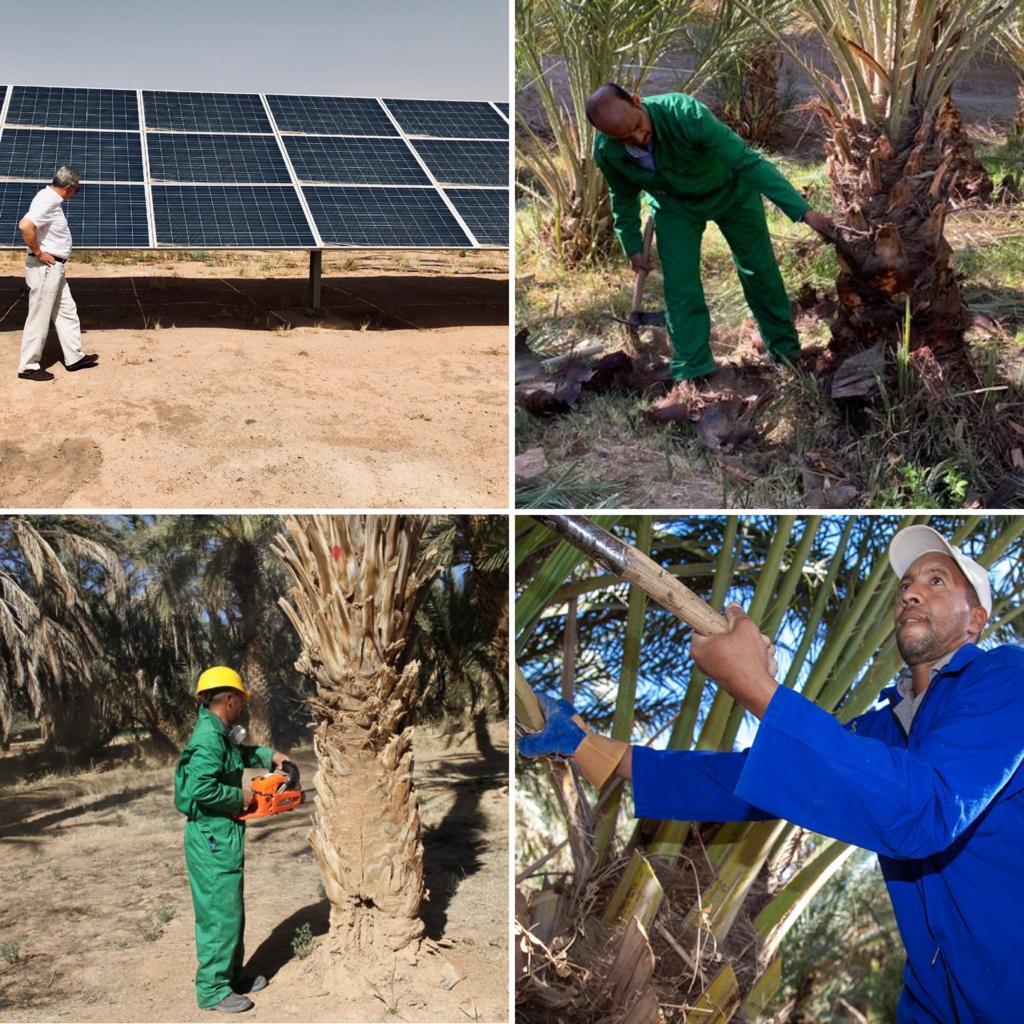
Focus sur la protection de l'environnement dans la filière phoenicole au Maroc
Meriem HILALI | 05/06/2020
La protection de l'environnement est une question d'importance majeure.Elle a des effets sur le bien-être des populations, particulièrement dans les zones oasiennes, qui sont fragiles.Dans le cadre du projet d’appui aux groupement d’intérêt économique pour le développement de la filière phœnicicole dans les oasis marocaines (projet PAGIE), Enabel et ses partenaires ANDZOA, ORMVAT, ORMVAO et ONCA, ont pris en considération cette composante de manière transversale, notamment grâce à deux initiatives :i) l’accompagnement et la formation des producteurs et productrices de dattes sur la protection des écosystèmes oasiens ; ii) l’appui en équipement des coopératives de services et l’installation de systèmes photovoltaïques au sein des unités de valorisation des dattes. 11 unités de valorisation sont actuellement en train d’être équipées de systèmes photovoltaïques. Ce système permettra à la fois de produire une énergie écologique et propre et de réaliser des économies conséquentes sur la facture d’électricité. Ces investissements couvriront ainsi la totalité de la facture énergique des unités, de leurs entrepôts frigorifiques en atmosphère contrôlée ou les caissons négatifs, particulièrement gourmands en énergie durant la saison chaude.22 coopératives de services ont reçu du matériel de production (outillage divers, équipements de protection), qui leur sert à entretenir les palmeraies et à nettoyer les touffes :Les risques d’incendies dans les oasis sont réduits ;Les déchets (palmes sèches) sont réutilisés pour la production de bois de chauffe et de compost naturel ;Les jeunes ruraux organisent la sensibilisation sur l’entretien des champs, l’économie en eau et la revitalisation des terroirs oasiens
-
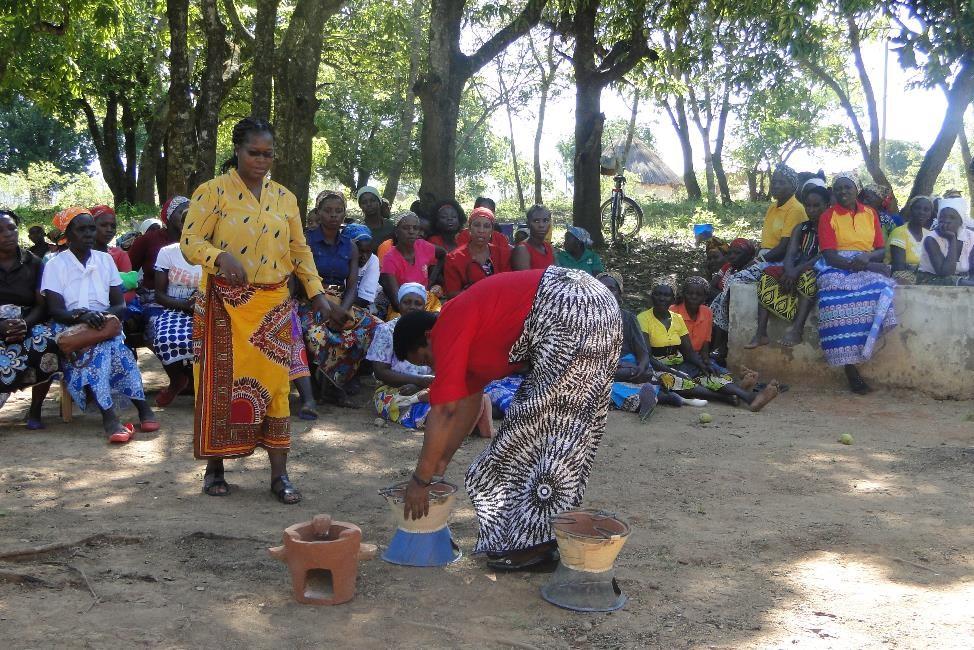
Mainstreaming gender in the (renewable) energy sector in Mozambique
Akila MUNIR | 05/06/2020
By: Evert Waeterloos, Enabel Mozambique Energy inequality and genderThe world today faces a significant energy divide between rich and poor countries, with more than 95% of the world’s population lacking access to electricity and clean cooking facilities living in sub-Saharan Africa and developing Asia. But energy inequality also persists within countries, for instance between income classes or regions, with the majority of people without access to electricity in their home residing in rural areas. For those in rural areas who do have access, lighting and television use account for at least 80% of electricity consumption; only 2% of the rural population uses electricity for cooking. Thus, 2.7 billion people rely daily on traditional biomass and solid fuels for cooking. The energy divide is also gendered. Women are to a large extent responsible for household and community energy provision. Thus, without access to modern energy services, women and girls spend most of their day performing basic subsistence tasks, including time-consuming and physically draining tasks of collecting biomass fuels. This constrains them from accessing decent wage employment or other livelihood options, educational opportunities, and social and political interactions outside the household. At the same time, cooking with biomass is particularly detrimental to the health of women and children. Illnesses from indoor pollution result in more deaths of women and children annually than HIV/AIDS, malaria, tuberculosis and malnutrition combined. Other important direct gendered health impacts include chronic diseases such as asthma, burns, injuries and violence against women and girls when collecting fuel from remote areas or at night (UNIDO/UNWomen 2013). In the context of the post-2015 development agenda, the UN launched in 2012 the “Sustainable Energy for All Initiative” (SE4ALL). The SE4ALL initiative aims to ensure universal access to modern energy services, double the global rate of improvement in energy efficiency, and double the share of renewable energy in the global energy mix by 2030. The consultation process has led to, among others, a focus on gender when working towards energy for all, and a proposal to extend the SE4ALL objectives with two additional targets: Reducing by half the number of premature deaths due to indoor and outdoor air pollution; and providing modern energy services to 400,000 primary healthcare service providers in developing countries (UNIDO/UNWomen 2013). Gender and renewable energy in MozambiqueMozambique ranks 142nd out of a total of 189 according to the UNDP Gender Inequality Index (2018). Of its population of 51% women, 72.2% live in rural areas and 24.1% are household heads. The social sectors of education and health have seen improvements in terms of gender equality and equal opportunities. However, the economic situation has seen limited improvements for the large majority of Mozambicans depending on small-scale agriculture and the informal economy. A main challenge is that the state and the judiciary are not sufficiently strong to implement legal instruments such as the Family Law and the Law Against Domestic Violence at the local level (Tvedten 2011). Mozambique has a huge energy potential of more than 23 TW. For rural electrification projects, the current technological evolution allows decentralised generation by harnessing renewable energy resources such as sun, wind, water, biomass and geothermal energy. This generation is off-grid at or near the point of use, where the users are the producers -whether individuals, small businesses and/or a local community. Such small-scale generation plants may ideally also be connected with each other or with nearby networks. Despite the wide range of socio-economic and environmental arguments in favour of such decentralised energy production, policy, legal, technical and financial barriers prevail. Specific examples are poor institutional frameworks and infrastructure; inadequate planning policies; uncoordinated actions in the energy sector; pricing distortions due to the strong subsidy of fossil energies; high initial capital costs of decentralised systems; weak dissemination strategies; lack of consumer awareness, skilled (wo)manpower and baseline information; and weak services and weak maintenance of infrastructures (Vezzoli et al. 2018).It is against this backdrop of access to clean, affordable, sustainable energy in Mozambique to promote economic development, poverty reduction, environmental sustainability and not in the least gender equity, that Enabel has this year sought expert guidance on gender mainstreaming its energy portfolio. This will include advice on gender-responsive policy frameworks; the promotion and training of women in business management and sustainable energy technology; and the promotion of equitable power relations within households, workplaces and communities. The elaboration of such a systematic approach through the Enabel project “Capacity Development of the Ministry of Mineral Resources and Energy (MIREME) and Energy Regulatory Authority (ARENE)” is also hoped to inform ongoing and future Enabel interventions in Mozambique on access to water and health and climate change adaptation/mitigation. REFERENCESTvedten, I. (2011) Mozambique Country Case Study: Gender Equality and Development, World Development Report 2012 Gender Equality And Development Background Paper, Bergen: Chr. Michelsen Institute, 30p.UNIDO/UNWomen (2013.) Sustainable Energy for All: the gender dimensions. Guidance Note: https://www.esmap.orgVezzoli, C., F.Ceschin, L.Osanjo, M.M’Rithaa, R.Moalosi, V.Nakazibwe, J.C.Diehl (2018) Designing Sustainable Energy for All. Sustainable Product-Service System Design Applied to Distributed Renewable Energy, Springer, ISBN978-3-319-70223-0
-
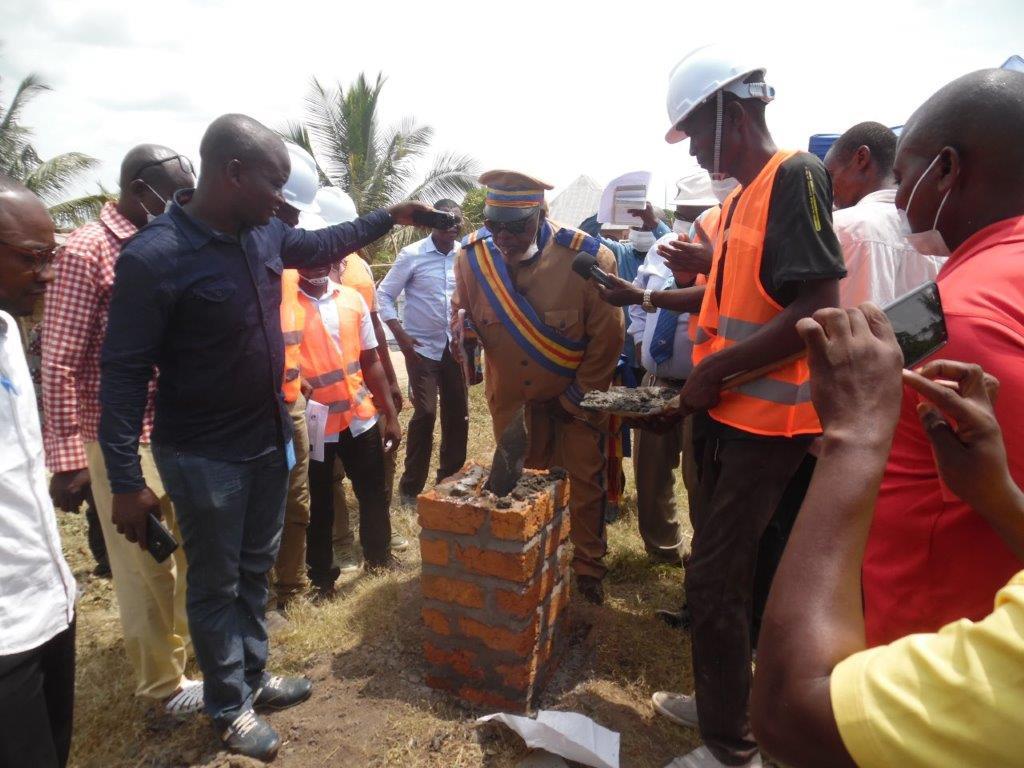
Réhabilitation des systèmes d'eau existants à Kindu & Kailo en RDC
Grâce MALI FAIDA | 03/06/2020
La réhabilitation et l’extension des systèmes d’eau potable existants dont RVA dans la ville de Kindu et Kailo dans le territoire de Kailo, ont été exécutées par le projet depuis le second semestre de 2019 et présentement, ces deux réseaux sont opérationnels à la satisfaction des populations bénéficiaires. Après signature des contrats de travaux en date du 20 mars 2020 pour les travaux de construction d’ouvrages hydrauliques des systèmes d’adduction d’eau, dans les quartiers péris urbains de la ville de Kindu (réseaux Big five, Basoko et Kabasoga) ainsi que dans la Cité de Lokando et son camp militaire, ont aussitôt démarré pour un délai contractuel d’exécution de 18 mois. Ces différents réseaux une fois mis en œuvre vont approvisionner une population de 110 000 habitants. Une innovation attendue ; la production sera à l’énergie solaire, pour un coût de production moindre et un impact climatique, logistique diminué (en back up un générateur sera présent pour les journées nuageuses ou de fortes consommations.) Une convention de subsides a été signée le 23 mars 2020 avec l’ONG locale UWAKI Maniema. Tenant compte du moment, il a été recommandé à cette ONG de s’atteler aux activités adaptées aux mesures de protection contre le Covid-19 telles qu’encourager l’utilisation des Dispositions de Lavage des Mains, des savons de qualité & meilleur marché, la diffusion des messages de sensibilisation sur les gestes barrières, … Une Unité de production de l’hypochlorite de sodium par énergie solaire pour la potabilisation de l’eau distribuée par l’ASUREP RVA vient de démarrer. Un appui pour les centres de santé est envisagé pour la décontamination des lieux d’isolement dû au Covid-19.Le projet vient de remettre officiellement au Comité provincial de riposte contre le Covid-19/Maniema, des masques de protection en tissu confectionnés localement.Toutes ces actions sont intégralement financées par le Gouvernement belge, celles-ci viennent résoudre les problèmes d’accès durable à l’eau potable de ces populations, ainsi que l’amélioration de leurs conditions d’hygiène et d’assainissement
-
Covid-19 : En RDC, le Kasaï-Oriental produit 2.000 masques en tissu
Grâce MALI FAIDA | 03/06/2020
Depuis le déclenchement de la pandémie du Covid-19 en RD Congo, le taux de contamination ne cesse d’augmenter. Dans un pays où le système de santé est fragile, nous nous sommes engagés dans la lutte collective contre le virus.Face à la demande grandissante durant cette période d’urgence sanitaire, la production des masques en tissu s’est imposée. En effet, disposant des filières de production locale de savons au Kasaï- Oriental, cette dernière a réadapté la production de savons en production de masques. L’initiative a pour objectif de confectionner et de distribuer 5000 masques au travers du Programme Santé Enabel, en support à la riposte à Kinshasa. D’ailleurs, on peut aussi ajouter que le Programme Eau Maniema appuie aussi la riposte à Kinshasa en se prêtant à la confection de masques.Conscient que le port du masque est primordial à la riposte, on a suivi toutes les recommandations selon les normes internationales afin d’accompagner ces filières dans le processus de fabrication.Le Programme Eau Kasaï- Oriental à Mbuji Mayi dispose désormais de 2000 masques. L’obligation du port du masque est une des mesures de lutte contre la propagation du Covid-19 mais elle doit s’accompagner de messages de sensibilisation.S’appuyant sur notre expertise en matière d’hygiène et d’assainissement, une vaste campagne de prévention est initiée afin de sensibiliser les populations à adopter les bons gestes barrières.La vulgarisation continuera tant qu'il n'y aura pas encore de vaccin afin de vaincre ensemble cette pandémie.
-
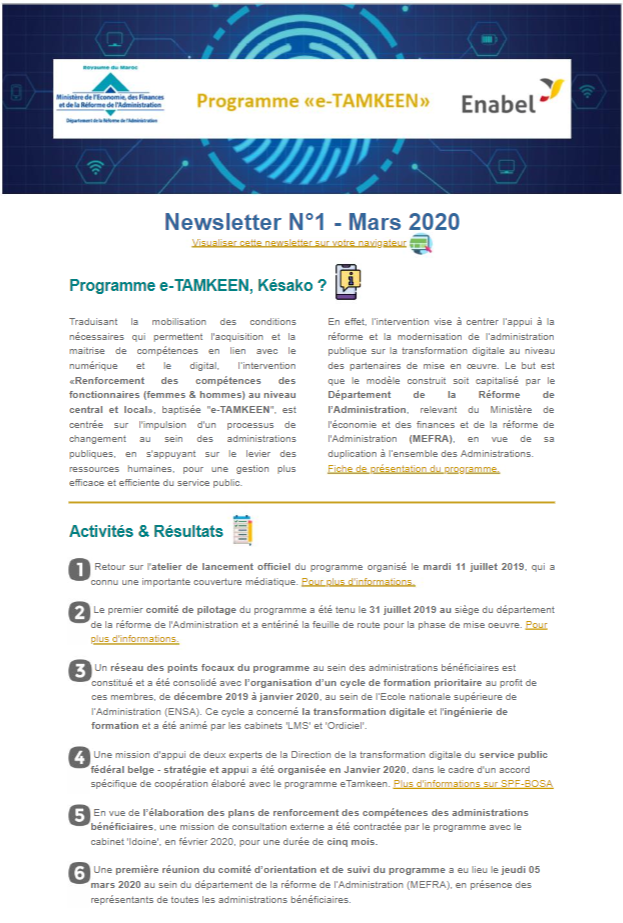
Consultez la 1ère édition de la newsletter trimestrielle de l’intervention e-TAMKEEN - Maroc
Bassam ALAOUI MDAGHRI | 01/06/2020
Lancement de la première édition de la newsletter trimestrielle de l’intervention e-TAMKEEN, un projet de renforcement des compétences des fonctionnaires au niveau central et local en matière de digitalisation. Consultez la newsletter via ce lien: https://bit.ly/2x26qcm
-

Filières du safran au Maroc: l’intégration des enfants de producteurs grâce la formation professionnelle
Meriem HILALI | 28/05/2020
Afin de faciliter l’intégration économique des fils et filles de producteurs, la formation professionnelle a été améliorée grâce à l’élaboration d’un guide et de fiches techniques ainsi que des films pédagogiques. Deux centres de qualification sont opérationnels et 131 apprentis ont été formés.Découvrez en plus à travers cette vidéo.
-

Filières du safran au Maroc: une attention particulière apportée à l’intégration des femmes
Meriem HILALI | 28/05/2020
Le projet de développement des filières du safran et du palmier dattier dans les régions de Souss-Massa et Drâa-Tafilalet a accordé une attention particulière à l’intégration des femmes dans les organisations professionnelles et à l’amélioration de leur positionnement dans les filières. Plusieurs actions spécifiques au genre ont donc été mises en place pour améliorer les conditions des femmes rurales, telles que la lutte contre l’analphabétisme et la promotion de l’entrepreneuriat féminin à travers la formation professionnelle. À l’issue du projet, 1237 femmes ont été alphabétisées dont 304 femmes grâce au projet TIGHRI et de nombreuses coopératives ont élu au moins une femme au sein de leur conseil d’administration. L’adoption de l’approche genre en agriculture a facilité l’accès des femmes aux actions du développement agricole, réduit les écarts entre les hommes et les femmes et amélioré leur situation économique par la création d’activités génératrices de revenus.Découvrez en plus à travers cette vidéo.
-

Découvrez les modes de production de 9 variétés de dattes marocaines
Meriem HILALI | 28/05/2020
Pour une meilleure mise en valeur des dattes marocaines, les agriculteurs présentent les modes de production et les caractéristiques nutritionnelles de 9 variétés phares des oasis du Drâa, Toudgha et Ouhmidi.Décoouvrez en plus à travers cette vidéo.
-

Le patrimoine phoenicicole marocain compte plus de 450 variétés de dattes
Meriem HILALI | 28/05/2020
Le patrimoine phoenicicole marocain compte aujourd'hui plus de 450 variétés de dattes et des milliers de variétés hybrides (croisement de variétés distinctes) appelés Khalts ou Sairs. Découvrez en plus à travers cette vidéo.
-

Système d’irrigation peu gourmand en eau dans la filière du safran au Maroc
Meriem HILALI | 28/05/2020
Dans la zone de production de l’or rouge du Maroc, le projet de Développement des Filières du Safran et du Palmier Dattier dans les régions Souss-Massa et Drâa-Tafilalet a mis en place un système d’irrigation goutte-à-goutte, peu gourmand en eau, contrairement à l’irrigation gravitaire traditionnelle.Découvrez en plus dans la vidéo.
-

Covid-19 : Campagne de sensibilisation sanitaire à destination de la population migrante au Maroc
Meriem HILALI | 28/05/2020
Dans le cadre des actions d’urgence face au Covid-19, le projet Empowerment juridique des personnes migrantes en partenariat avec l’ALCS, l’Association de Lutte Contre le Sida, ont entamé un partenariat dans le cadre d’une campagne de sensibilisation dans la région de Tanger-Tétouan-Al Hoceïma. L’intervention appui et finance la réalisation de capsules vidéo de sensibilisation sanitaire, dépliants et affiches ciblant la population migrante de cette région. Les capsules sont en plusieurs langues africaines (Baoulé, Lingala, Malinké, Pulhar, Soussou, Wolof) en plus du français.Pour en savoir plus cliquer sur : https://www.youtube.com/cha…/UCfED1I3YZoufz0hErG2EiPQ/videos
-
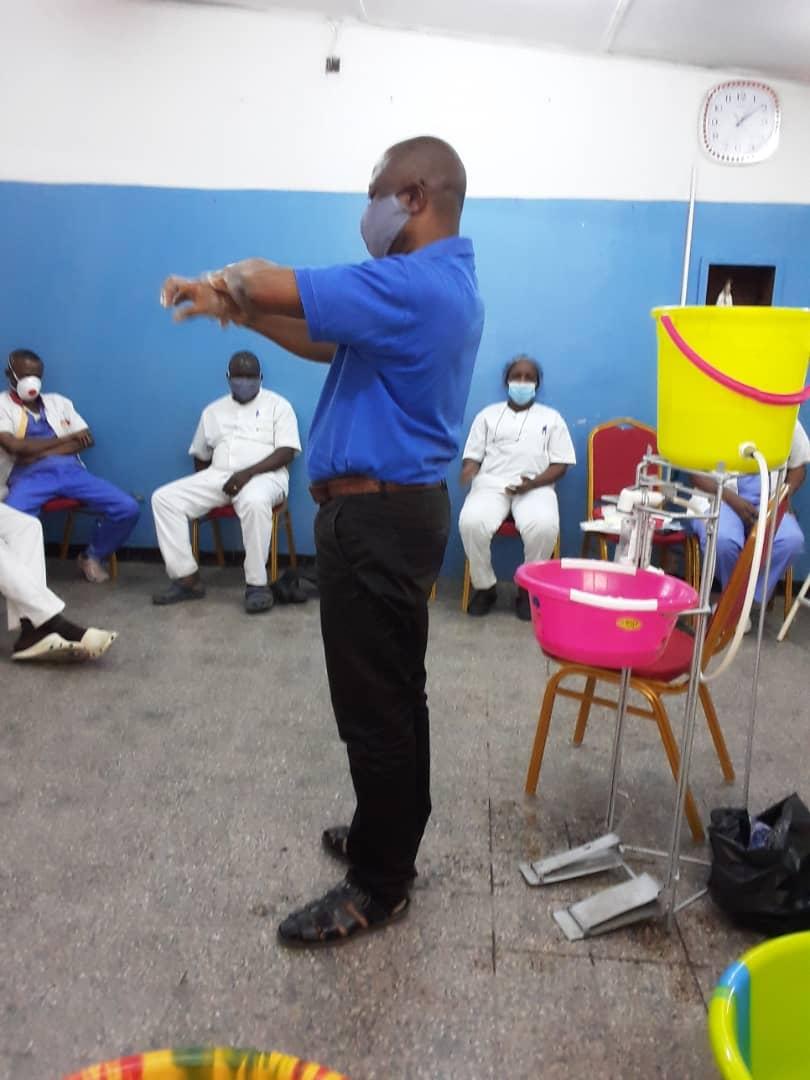
Formation en prévention et controle de l'infection pour le personnel de l'hôpital St Jospeh en RDC
Grâce MALI FAIDA | 28/05/2020
Le programme de renforcement de l’hôpital général de référence Saint Joseph de Limete a organisé du 25 au 27 mai 2020 une première formation intégrée en prévention et contrôle de l’infection (PCI) liée au Covid-19 au profit de 20 agents de cet hôpital. La formation s’est déroulée à l’hôpital avec la participation d'infirmiers, de médecins, du personnel administratif et des techniciens de surface. Le but de cette formation est de mieux protéger la biosécurité du personnel et des patients à St Joseph dans tous les services en renforçant la connaissance et la pratique de l’ABC de prévention et contrôle d’infection, mais en améliorant la gestion de l’hygiène dans l’hôpital. Un véritable comité d’hygiène se responsabilisera de tous les aspects en lien avec ce domaine : gestion d’eaux usés, gestion de déchets solides, buanderie et incinérateurs, mise en place de poubelles et hygiène dans tous les services.Cette formation, urgente vu la nécessité de bloquer la propagation du Coronavirus dans l’hôpital, est la première dans un plan de développement des ressources humaines qui s’annonce pour St Joseph et qui mettra l’accent sur : L’amélioration de la qualité des soins à travers la formation continue, modulaire et avec l’application de nouvelle technologie informatisée ; Le renforcement de la rationalisation et efficience de tous les services de l’hôpital, cliniques et autres. Cette formation s’étendra pour former au total 100 agents de différentes catégories professionnelles au service de cet hôpital.
-

« Transformer et commercialiser la noix de cajou : un projet modèle d'Enabel au Bénin »
Reece-hermine ADANWENON | 18/05/2020
Avec 20 années d’expériences avérées dans l’appui aux filières agricoles, Enabel au Bénin travaille sur la chaine de valeur de l'anacarde, produit énigmatique du pays. Ce programme met l’accent sur l’augmentation de la production et de la productivité, l’amélioration du taux de transformation locale des noix et de la pomme d’anacarde et le renforcement de la commercialisation et de l’exportation des noix. Le but est de mettre aux normes les techniques de production, de rendre plus exportable la noix et ses dérivés afin d’augmenter lex niveaux de vie et de revenus des producteurs et transformateurs. Via le contrat de partenariat établit entre Enabel et COLRUYT group, une chaine de supermarchés belge, 250 tonnes d’amandes de cajou conventionnelles et 70 tonnes d’amandes de cajou biologiques seront exportées chaque année du Bénin vers la Belgique. Découvrez ce programme à travers cette interview de Kader Toko Worou, responsable du projet.
-
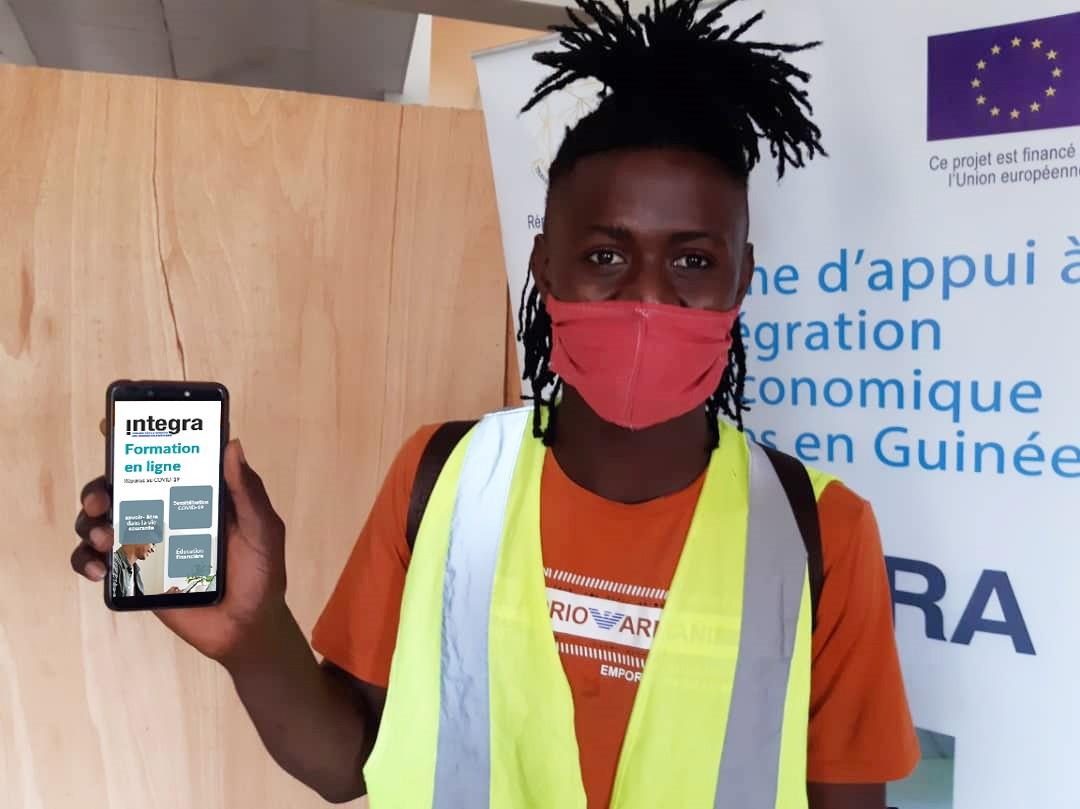
Covid-19 : la formation aux bouts des doigts avec le projet INTEGRA en Guinée
Aissatou BAH | 15/05/2020
Le programme d’appui à l’intégration Socio-Economique des jeunes (INTEGRA) va procéder, ce lundi 18 mai 2020 au lancement de son plan pilote de formation en ligne, afin que ses bénéficiaires puissent continuer à apprendre malgré les restrictions sanitaires liées à l’épidémie du COVID-19. Le principe est d’assurer la continuité des activités par l’administration de modules de formation à distance, auprès des deux cents jeunes engagés dans ce parcours.Cette offre a plusieurs objectifs : - Former les jeunes à mieux s’insérer dans le monde du travail en contribuant à l’amélioration de leur employabilité. - Diminuer le nombre de jeunes dans les salles de cours afin de maintenir une distance sociale de sécurité (1m50) pour réduire les risques de propagation du COVID-19.- Permettre l’utilisation et le développement des ressources numériques. Ces nouveaux modules de formation abordent plusieurs thèmes : - Le savoir- être dans la vie courante et sur le lieu de travail- L’éducation financière - La sensibilisation aux risques liés à la migration dangereuse, elle-même liée au COVID-19. Les contenus sont développés sous des formats vidéo, en langues locales, et proposent des présentations adaptées pour faciliter la compréhension des apprenants. Ils sont accessibles via une plateforme Open Source. Les apprenants participant à ce programme reçoivent une rémunération journalière de 35 000 GNF dont 15 000 GNF en épargne capitalisée.Ils bénéficient également d’un accompagnement et d’une dotation hebdomadaire de connexion à Internet pour faciliter le téléchargement des contenus des cours.Le programme INTEGRA se veut une contribution pour amorcer de nouvelles dynamiques dans le développement socio-économique en Guinée.Financé par l'Union européenne, INTEGRA crée des opportunités pour la jeunesse guinéenne à travers la préparation à la vie professionnelle dans les établissements scolaires, la réalisation d’infrastructures économiques, la formation professionnelle, la création d’emplois durables et le développement de l’entrepreneuriat. A travers ce programme, ce sont plus de 15.000 jeunes qui seront directement accompagnés pour mettre en œuvre cette nouvelle dynamique socio-économique par la création d’emplois et des appuis au développement de l’entrepreneuriat en Guinée.
